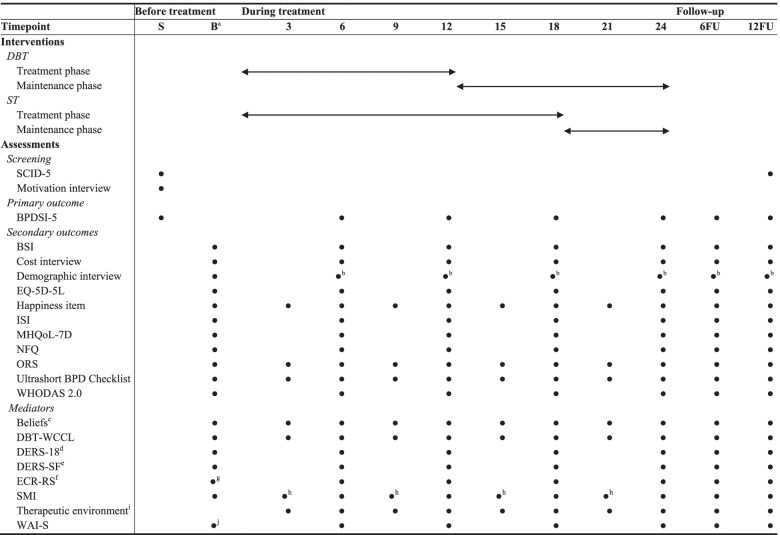Table 1.
Overview of instruments
S Screening, B Baseline assessment; 3/6/9/12/15/18/21/24 = 3/6/9/12/15/18/21/24 months after start of the treatment phase, 6 FU Follow-up at 6 months after end of treatment, 12 FU Follow-up at 12 months after end of treatment, BPDSI-5 Borderline Personality Severity Index, fifth edition, BPD Borderline personality disorder, BSI Brief Symptom Inventory, DBT-WCCL Dialectical Behavior Therapy-Ways of Coping Checklist, DERS-18 Difficulties in Emotion Regulation Scale 18, DERS-SF Difficulties in Emotion Regulation Scale Short Form, ECR-RS Experiences in Close Relationships-Relationship Structures questionnaire, EQ-5D-5L 5-level EuroQol 5D version, ISI Insomnia Severity Index, MHQoL-7D Mental Health Quality of Life seven-dimensional Questionnaire, NFQ Nightmare Frequency Questionnaire, ORS Outcome Rating Scale, SCID-5 Structured Clinical Interview for DSM-5, SMI Schema Mode Inventory, WAI-S Working Alliance Inventory-Short, WHODAS 2.0 World Health Organization Disability Assessment Schedule 2.0
aThe potential predictors of (differential) treatment response that are assessed only once at baseline are not included in this table
bA shortened version
cIncluding three to five idiosyncratic dysfunctional beliefs and one functional belief
dDERS-18 subscale ‘Awareness’
eExcluding the subscale ‘Awareness’
fThree versions of the ECR-RS will be assessed, measuring general attachment style and attachment styles with respect to two targets (i.e., most important therapist and group members)
gTwo versions, measuring attachment styles with respect to two targets (i.e., most important therapist and group members), are assessed after the third group session
hSMI subscales Vulnerable Child, Angry Child, Impulsive Child, Detached Protector, Punitive Parent, and Healthy Adult
iKey characteristics of a promoting therapeutic environment (i.e., genuineness, safety, and equality) are assessed by 13 items formulated by ST experts
jAssessed after the third group session

